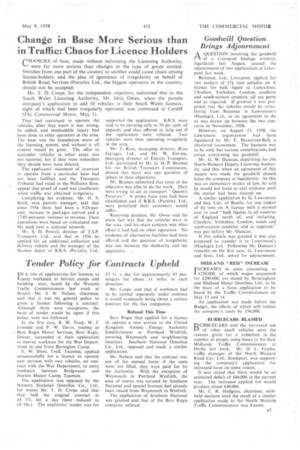Change in Base More Serious than in Traffic: Chaos for Licence Holders
Page 37

If you've noticed an error in this article please click here to report it so we can fix it.
CHANGES of base, made without informing the Licensing Authority,
were far more serious than changes in the type of goods carried. Switches from one part of the country to another could cause chaos among licence-holders, and the plea of ignorance of irregularity on behalf of British Road Services (Parcels), Ltd., the biggest operators in the country, should not be accepted.
Mr. T. D. Corpe, for the independent objectors, submitted this to the South Wales Licensing Authority, Mr. Idris Owen, when the parcels company's application to add 18 vehicles to their South Wales licences; eight of which had been irregularly operated, was continued at Cardiff (The Commercial Motor, May 1).
They had continued to operate the vehicles, after they knew it was wrong, he added, and incalculable injury had been done to other operators in the area. The base was the foundation stone of the licensing system, and without it all control would be gone. The offer to surrender vehicles in other areas was not material, for if they were redundant they should have been deleted.
The applicants' statement of intention to operate from a particular base had not been fulfilled and the Transport Tribunal had ruled in the Williams Bros. appeal that proof of need was insufficient when traffic was obtained irregularly.
Completing his evidence, Mr. H. S. Reed, area parcels manager, said that since 1956 there had been a 9.24-percent. increase in packages carried and a 17.85-per-cent. increase in revenue. Their operations were based on articulated outfits used over a national network.
Mr. S. D. Powell, director of T.S.P. Transport, Ltd., said that in 1956 he applied for an additional collection and delivery vehicle and the manager of the Skewen depot of B.R.S. (Parcels), Ltd., supported the application. B.R.S. were said to he carrying only to 70 per cent, of capacity and they offered to help out if the application were refused. Two vehicles were then operating irregularly in the area.
Mr. T. Ross, managing director, Ross Garages. Ltd., and Mr. W. Entress, managing director of Entress Transport, Ltd„ questioned by Mr. G. H. P. Beames for the British Transport Commission, denied that there was any question of spleen in their objections.
Mr. Beanies submitted that none of the objectors was able to do the work. They were trying to act as transport " Queen's Proctors." A prima facie case had been established and if B.R.S. (Parcels), Ltd., were penalized their customers would suffer.
Reserving decision, Mr. Owen said the plain fact was that the vehicles were in the area, and his main concern was what effect it had had on other operators. No evidence of alternative facilities had been offered and the question of irregularity was one between the Authority and the applicants. .




































































































